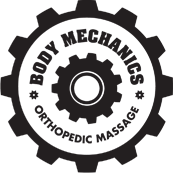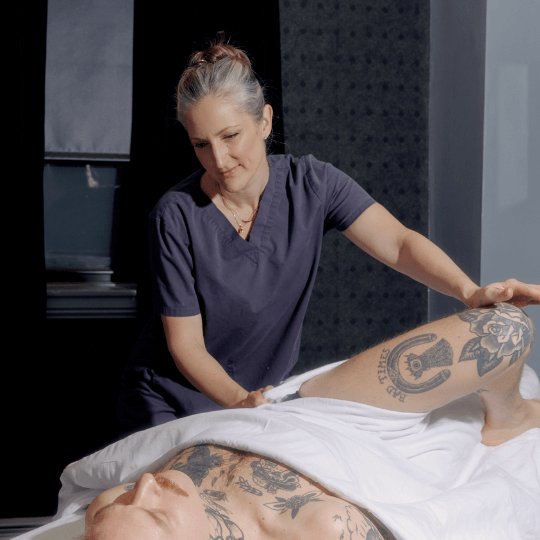Experience Relief with TMJ Massage at Body Mechanics NYC
The temporomandibular joint (TMJ) connects our lower jaw to the base of our skull, enabling us to open our mouths for chewing, laughing, and speaking. When this joint becomes inflamed, it leads to TMJ dysfunction, a condition affecting 5% to 12% of the U.S. population. This can cause pain and difficulty when using the joint for activities such as eating and talking. Are you experiencing symptoms of TMJ dysfunction? Body Mechanics is dedicated to providing specialized TMJ Massage therapy to help alleviate the discomfort associated with temporomandibular joint (TMJ) dysfunction. Our skilled massage therapists are committed to helping you find relief from jaw pain, tension headaches, and other symptoms, allowing you to enjoy greater comfort and improved quality of life.
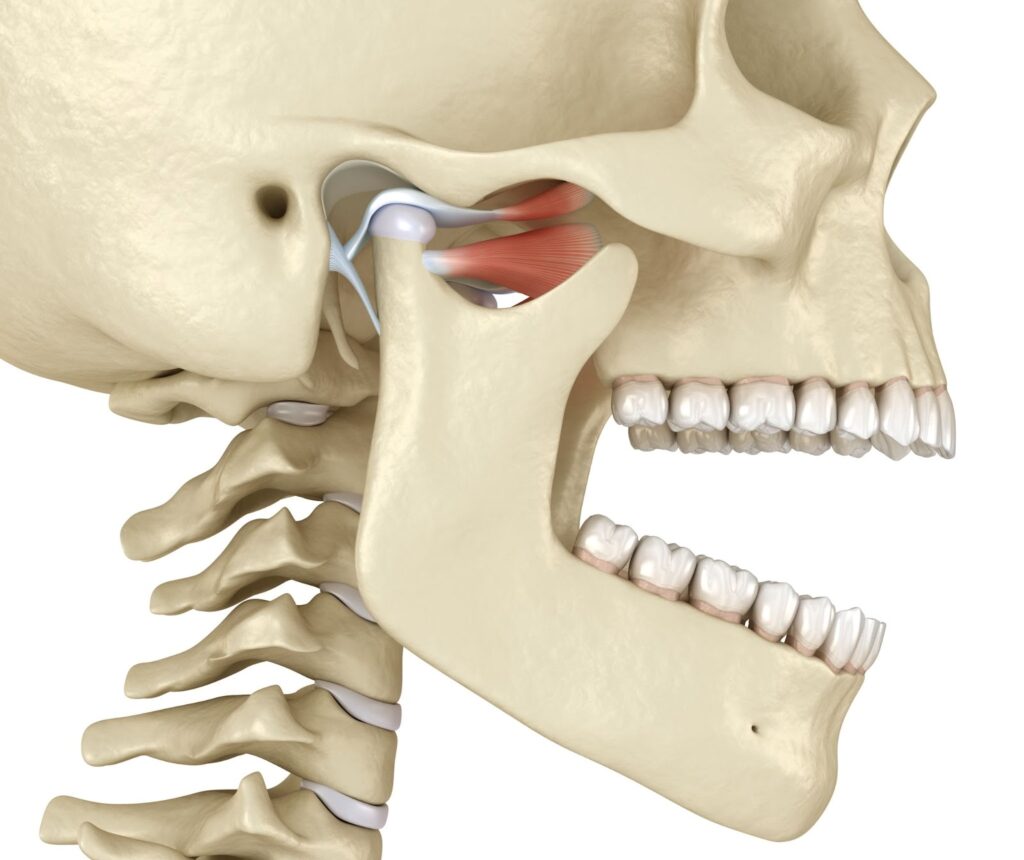
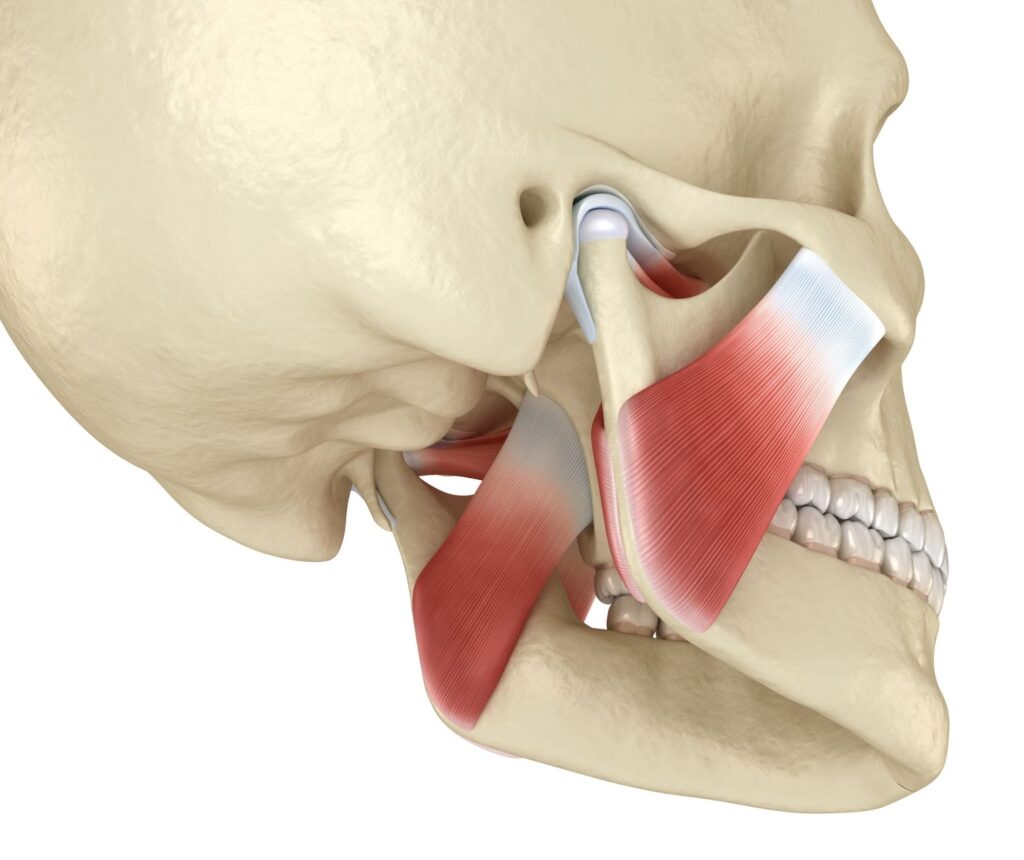
Approximately 35 million Americans suffer from TMJ. While TMJ massage is not necessarily its own treatment style, we believe it deserves its own category because of the syndrome’s location and the way it is treated. TMJ can be debilitating for some and merely annoying for others. Complaints include chronic headaches, dizziness, difficulty concentrating, pain, and some teeth grinding. While not everyone has all the symptoms, and there are a variety of causes, we have developed a supportive treatment we really believe in. We use both external and intra-oral techniques in our TMJ massage program, depending on your comfort level and needs. Even if you have not addressed it before, we have, and you can take comfort in our understanding of the problem.
Our approach with the TMJ massage program is gentle. We include massage and stretching to help manage pain, with the goal of improved function. The TMJ massage treatment can be a full session devoted to the head, neck, and shoulders or be incorporated into one of our relaxation treatments. Check our prices or visit us in Midtown, NYC, today.
The prevalence of temporomandibular joint and muscle disorder (TMJD) is between 5% and 12%. Unusual for chronic pain conditions, the prevalence rates of TMJ disorders are higher among younger persons. –Source
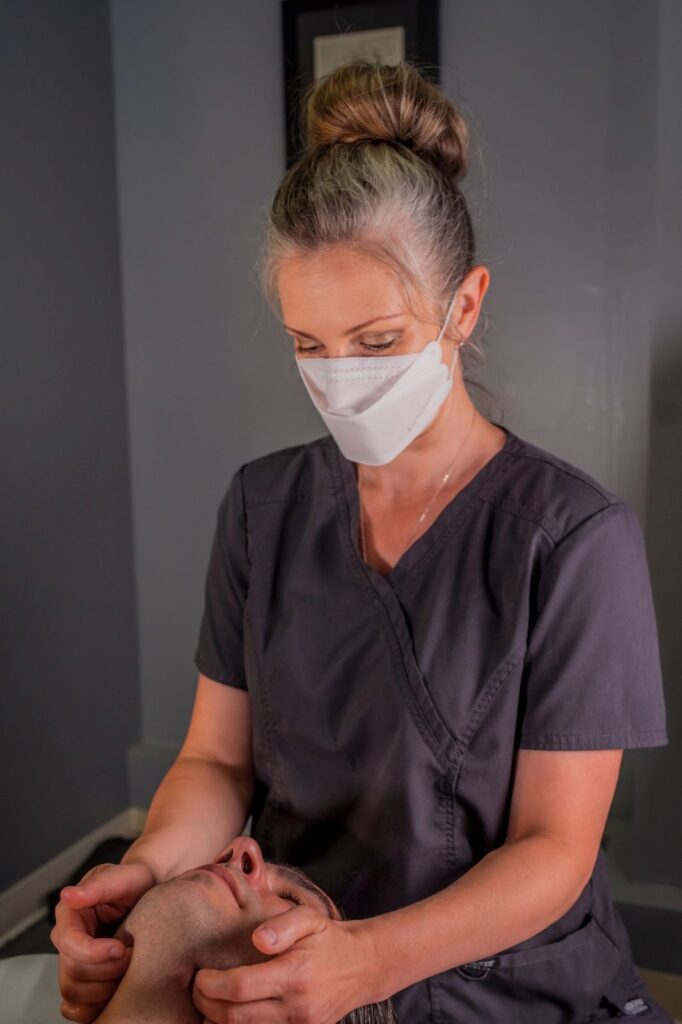
Types of Massage Body Mechanics NYC’s offer:
- NYC Massage Therapy
- Therapeutic Massage
- Sports Massage
- Prenatal Massage
- Medical Massage
About TMJ Massage at Body Mechanics NYC
TMJ Massage therapy focuses on addressing tension, tightness, and dysfunction in the muscles surrounding the temporomandibular joint, which connects your jaw to your skull. This non-invasive approach aims to reduce pain, improve jaw mobility, and restore balance to the muscles involved in chewing and jaw movement.
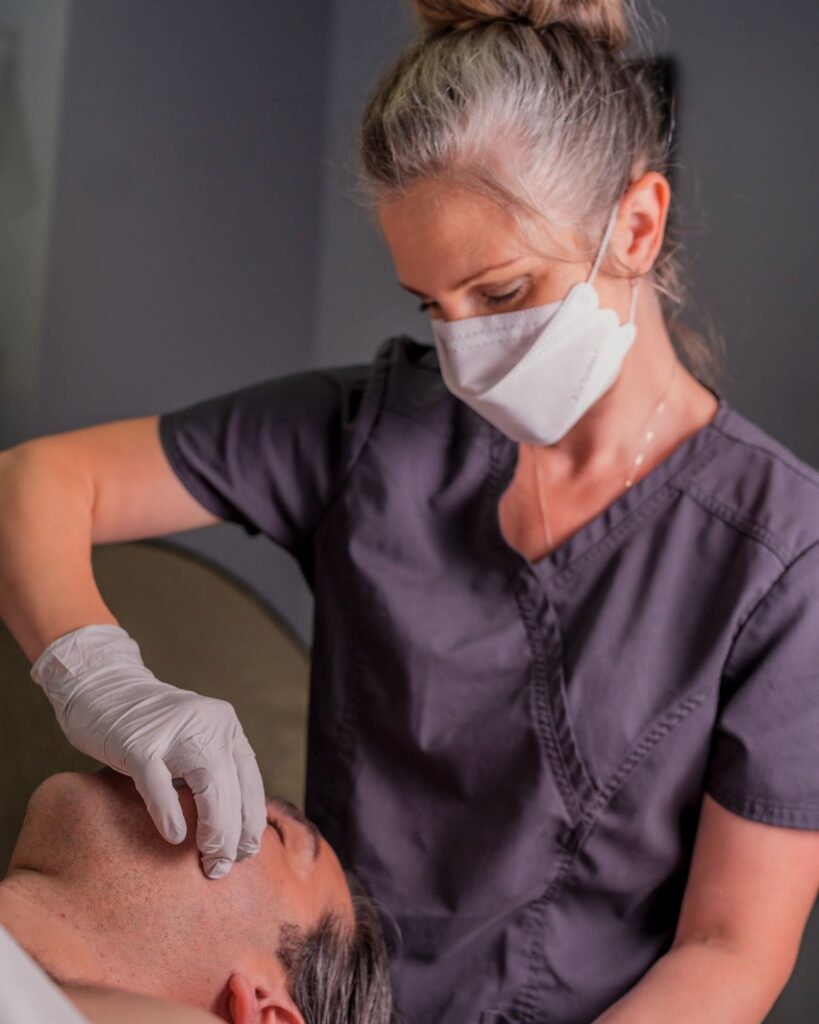
What to Expect After Your TMJ Massage at Body Mechanics
Your TMJ Massage session at Body Mechanics is complete, and you’re likely feeling more relaxed and comfortable than when you arrived. But what can you expect in the hours and days following your treatment? Here’s a guide to what you may experience after your TMJ Massage:
- Decrease in pain. Many people find a decrease in pain and pain re-occurrence after treatment. While for some it is immediate, a 10-20% reduction is very normal. Not all people are the same and not all outcomes can be predicted. If the pain is not muscular in nature, the benefit may be different.
- Increased Mobility: As the muscles surrounding your temporomandibular joint (TMJ) begin to relax and loosen, you may notice an improvement in your jaw mobility. You may find it easier to open and close your mouth, chew food, and perform everyday activities without experiencing the same level of restriction or discomfort.
- Reduced Tension Headaches: TMJ dysfunction is often associated with tension headaches, which can be debilitating and affect your quality of life. After your TMJ Massage session, you may experience a significant reduction in the frequency and intensity of tension headaches, allowing you to enjoy greater comfort and mental clarity.
- Improved Sleep Quality: Many clients report improved sleep quality following their TMJ Massage session. By releasing tension in the jaw and facial muscles, TMJ Massage promotes relaxation and stress relief, making it easier to fall asleep, stay asleep, and wake up feeling refreshed.
- Slight Soreness or Fatigue: It’s not uncommon to experience some mild soreness or fatigue in the hours following your TMJ Massage session, especially if your muscles are particularly tight or tense. This is a normal response to the release of tension and toxins from the muscles and should resolve within a day or two.
- Self-Care: To support the benefits of your TMJ Massage session and promote optimal recovery, it’s important to engage in self-care practices. Drink plenty of water to flush out toxins, and apply heat or ice to areas of soreness as needed. Your therapist will advise on your specific home care.
- Long-Term Benefits: While you may experience immediate relief and improvements in your symptoms after your TMJ Massage session, the long-term benefits of regular treatment are even more significant. Consistent TMJ Massage therapy can prevent future episodes of pain and dysfunction.
- Follow-Up Care and Maintenance: Your massage therapist may provide you with personalized recommendations for follow-up care and maintenance to help you prolong the benefits of your TMJ Massage session. This may include stretching exercises, self-massage techniques, and lifestyle modifications to support your ongoing well-being.
It has been suggested that massage therapy for TMD improves both the subjective and objective health status.”Miernik M, Więckiewicz M, Paradowska A, Wieckiewicz W (September–October 2012).” –Source
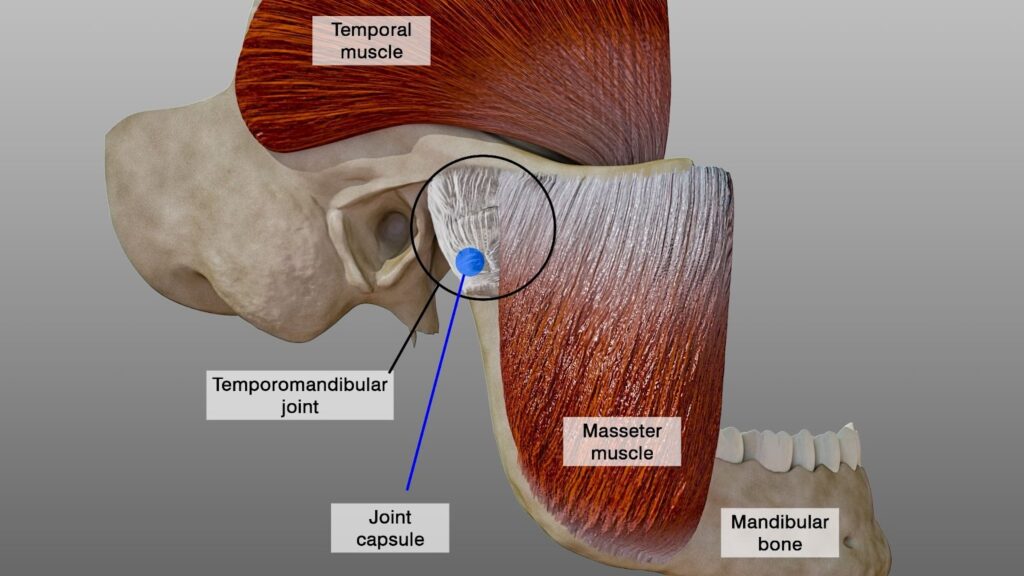
TMJ Home Care
Optimal Frequency for TMJ Massage Therapy
The frequency of TMJ massage can vary depending on individual needs and the severity of TMJ symptoms. As a general guideline, you are the person who determines your treatment frequency:
- Mild Symptoms: For individuals experiencing occasional discomfort or tension in the jaw, spot treatment as needed to provide relief and prevent further aggravation.
- Moderate Symptoms: Those with moderate TMJ symptoms, including frequent jaw pain or difficulty with jaw movement, may benefit from 1 session per month to address muscle tension and promote relaxation.
- Severe Symptoms: Individuals with severe TMJ issues, such as chronic pain, limited jaw movement, or TMJ disorder (TMD), may require more frequent sessions, possibly once a week or as needed, especially during periods of acute flare-ups.
It’s essential to listen to your body and adjust the frequency of TMJ massage based on how you respond to treatment. Consulting with a healthcare professional or a licensed massage therapist can help determine the optimal frequency and duration of TMJ massage therapy fitted to your specific needs.
Watch a short demo of the intra-oral massage.
Check out our two Manhattan offices
With two prime Manhattan locations, visiting us is a breeze. Don’t hesitate to reach out for questions or to schedule your appointment by calling 212-600-4808. We’re here to support you!
- Midtown Manhattan Massage Therapy 250 W 54th St #804, New York, NY 10019
- Downtown Massage Clinic1 W 34th St #204, New York, NY 10001
Gratuities are not included in service pricing, tips at this location may be left in cash or Venmo
Frequently Asked Questions :
What is TMJ Massage, and how can it help with TMJ dysfunction?
TMJ Massage is a specialized form of massage therapy that focuses on addressing tension, tightness, and dysfunction in the muscles surrounding the temporomandibular joint. By releasing tight muscles and promoting relaxation, TMJ Massage can help alleviate pain, reduce inflammation, and improve jaw mobility.
What causes TMJ dysfunction, and what are the symptoms?
TMJ dysfunction can be caused by a variety of factors, including stress, muscle tension, teeth grinding (bruxism), jaw misalignment, arthritis, and trauma to the jaw. Common symptoms of TMJ dysfunction may include jaw pain, stiffness or clicking in the jaw joint, headaches, earaches, facial pain, difficulty chewing or opening/closing the mouth, and jaw locking.
How many TMJ Massage sessions will I need to see results?
The number of TMJ Massage sessions needed varies depending on the severity of your TMJ dysfunction, your overall health, and your response to treatment. Some clients may experience significant improvement after just one session, while others may require multiple sessions to achieve lasting relief. Your massage therapist will work with you to develop a personalized treatment plan based on your individual needs and goals.
Is TMJ Massage covered by insurance?
In some cases, TMJ Massage therapy may be covered by health insurance if it is prescribed by a healthcare provider as part of a treatment plan for TMJ dysfunction. We recommend checking with your insurance provider to determine your coverage eligibility and any requirements for reimbursement. You can usually also use your FSA and HSA cards for such treatment.
Are your massage therapists certified and trained in TMJ Massage therapy?
Yes, all of our massage therapists are certified professionals with extensive training in TMJ Massage therapy. They undergo specialized education and hands-on training to ensure they possess the knowledge and skills necessary to provide effective treatment for TMJ dysfunction.
What should I expect during a TMJ Massage session at Body Mechanics?
During your TMJ Massage session, your therapist will begin by conducting a thorough assessment to evaluate your jaw function, range of motion, and areas of tension or discomfort. Based on this assessment, they will develop a customized treatment plan that may include a combination of massage techniques, stretching exercises, and relaxation techniques aimed at reducing pain, improving jaw mobility, and promoting overall well-being.
How is the intra-oral portion performed?
For the intra-oral portion of the massage, your therapist will put on nitrile gloves and massage the inside of your mouth along the gum line and into the joint.
Do I need the intra-oral portion?
No, not all people need the intra-oral portion of the treatment. Some people have more neck-dominant or shoulder-dominant TMD/TMJ pain, and those people may opt to skip the intra-oral portion. Your therapist will talk to you about your options.
I am allergic to latex. Do you have other kinds of gloves?
We only use nitrile gloves in the office due to allergies.
Will the TMD/TMJ massage help my ear rigging?
It depends. We recommend connecting with an ear nose and throat specialist or audiologist to find out the cause of your ears ringing and screen for problems. Some ear ringing is muscular and can improve through massage but this does not represent all cases.
TMJ Home Care
I have terrible TMJ. Headaches, jaw ache, stiff neck. Too much stress and too much sitting in front of a computer which wrecks my neck. I’ve tried mouth guards…no good. My chiropractor helps but it doesn’t last. But when I began having Beret work on my neck and jaw the difference was amazing. She stretches my neck, at the same time breaking down the knots. She works on the small muscles under my jaw line. Ouch. But what an improvement. This is not a spa massage! This is a ‘fix a problem I’ve had for years’ massage. I immediately feel the difference. What she does lasts me almost a month with no retuning on her part but I only stretch it to a month because she has been working out of Brooklyn and that’s a hike for me. Now that she’s moving into Manhattan I will see her every other week. I can’t wait.
Candace L.
New York, New York
